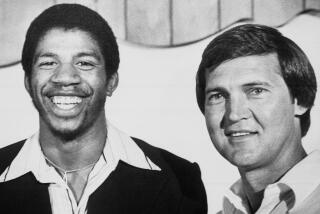BLUESMAN MAGIC SAM: HIS LEGEND LIVES ON
- Share via
What if he hadn’t died so young?
Among rock fans, that kind of speculation usually centers on icons like Jimi Hendrix and Buddy Holly. Among some of Los Angeles’ tradition-minded young rockers, it’s singer-guitarist Magic Sam, who was on the verge of recognition as a major blues talent before his death in 1969 at 32.
“Sam played some wild, outside stuff that was like Jimi Hendrix for his time,” says Kid Ramos, guitarist for the James Harman Band. “He was one of the young Chicago blues guys, the string-bending players who were more city guys than Muddy Waters.”
Sam’s local admirers aren’t confined to the blues sphere. Sid Griffin of the Byrds-influenced Long Ryders ranks him with country-rock legend Gram Parsons as a personal inspiration.
Now there’s a resurgence of interest in Magic Sam. The small Delmark label in Chicago released a double album of roughly recorded live performances last year, and recently reissued the classic 1968 studio LP “West Side Soul.”
Born Samuel Maghett, Magic Sam moved with his family to Chicago from Mississippi in 1950 and was playing professionally six years later at 19. His sound was so distinctive on the fiercely competitive Chicago blues circuit that famed songwriter/producer Willie Dixon took him into the studio in 1957.
“Sam was playing a straight 12-bar pattern to a certain extent, but the harmonies he carried with the chords was a different thing altogether,” Dixon remembers. “The thing I accepted him on was his high voice expressed ‘All Your Love’ with such an inspirational feeling.”
That song gave Maghett a regional hit on the Cobra label, but then the entire Chicago blues scene was swamped by the rock ‘n’ roll tidal wave. Magic Sam retreated to local bars and sharpened his skills before Delmark gave him another shot in 1968 with “West Side Soul.”
“It’s a landmark in the same way ‘Kind of Blue’ or ‘In a Silent Way’ are for Miles Davis in jazz,” Long Ryder Griffin enthuses. “People that are really into electric Chicago blues and don’t know ‘West Side Soul’ should have their little blues diplomas revoked.”
Magic Sam consolidated the momentum with some powerful appearances at big European and American festivals. His last live performance was a weeklong engagement in 1969 at L.A.’s now defunct Ash Grove club. Guitarist Hollywood Fats of the James Harman Band, then a 15-year-old blues neophyte, shared that bill.
“Sam was a real quiet, soft-spoken guy,” Fats recalls. “He seemed real reserved and had that same demeanor on the bandstand, but he would just be on fire.
“He didn’t dance around or do choreography but you couldn’t take your eyes off the dude because he was putting so much of himself into what he was doing. He was just a great bluesman, shot from the hip.”
The following week in Chicago, Magic Sam complained of heartburn after eating breakfast and dropped dead from a heart attack.
What if he hadn’t died? Well, Magic Sam probably had a better shot at a wider audience than most of his colleagues. His flashy instrumental style could easily have appealed to the guitar-hero element of the rock crowd. His albums incorporated soul flavorings and other contemporary elements into blues-based material. As it stands, Magic Sam’s chief legacy will be his impact on music to come.
“Sam has a very rough, black, electric American sound,” summarizes Griffin. “It’s a huge chunk of Americana, the musical equivalent of chili fries or something. When we go back in the alley and look for something rootsy and real, Magic Sam is a landmark.”
More to Read
The biggest entertainment stories
Get our big stories about Hollywood, film, television, music, arts, culture and more right in your inbox as soon as they publish.
You may occasionally receive promotional content from the Los Angeles Times.










